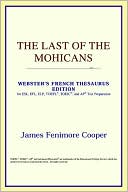

 |

|

The average rating for Last of the Mohicans based on 2 reviews is 2 stars.
Review # 1 was written on 2009-08-02 00:00:00 Dawn Robertson Dawn RobertsonIf time travel were possible, I'd go back in time and assassinate James Fenimore Cooper before he ever put pen to paper (in this imaginary scenario, let it be known that I also possess mad ninja skills). Why do I hate Cooper so much? Let me count the ways: 1) His never-ending description of every rock, twig, river, etc., with which the main characters come into contact. No pebble escapes his scrutiny, no leaf his lingering gaze. This book would have been 3 pages long without the description. And even then, it would have been 3 pages too long. 2) Native American dialogue is limited to the occasional exclamation of "Hugh." Not Hugh as in Hefner, but something more like "huh." They're a quiet people, apparently. I'm shocked they don't greet each other by saying, "How." 2 1/2) While we're on the subject, they're all stereotypes of either the noble savage variety or the "me big chief Ugh-a-Mug gotta have 'em squaw" variety. The whole thing is a racist piece of crap. And don't tell me that Cooper was reflecting the beliefs of the time because, while that may explain the racism, it doesn't explain away the crap bit. 3) Practically every speech by Hawk-eye will contain some bit of dialogue such as, "Even though white blood runs through my veins." Lest we forget he's white since he's been hobnobbing with the natives for so long. 4) Those damn women just keep getting kidnapped. 5) For an action story, it's mind-numbingly boring. To illustrate, I give you a riveting, action packed scene in which Duncan, the British officer, tries to distract le Renard Subtil (also known as Magua, also known as Wes Studi in the film) with a discussion of French etymology: 'Here is some confusion in names between us, le Renard,' said Duncan, hoping to provoke a discussion. 'Daim is the French for deer, and cerf for stag; elan is the true term, when one would speak of an elk.' Dash cunning of him, don't you think? It sure would have sucked if he had just attacked him with a knife, a gun, or even a rapier wit. Apparently Duncan's plan is to wear down his enemy with sheer boredom. 6) Everyone is known by about three or four different names, because anything less would have been confusing. Right, Coop? 7) Did I mention that it's just frickin' boring? I would rather slam my head in a car door than ever read this book again. The best part about the book is that there are entire sections in French. For once, lack of knowledge about a foreign language has paid off! I was practically giddy with excitement when I encountered entire pages of French dialogue as it meant, mon Dieu!, I got to skip the entire page. Cross posted at This Insignificant Cinder |
Review # 2 was written on 2013-03-12 00:00:00 James Cantwell James CantwellWhat can one say about Cooper? His historical imagination is profound, his creative use of the gothic landscape is uniquely American, and his influence on plot and characterization in American fiction--including, I recently discovered, South American fiction--is pervasive and extensive. Yet his diction is so often trite, his style so plodding and crabbed, his syntax so convoluted, that it is difficult to read more than a few pages of "The Last of the Mohicans" without throwing the book across the room in disgust. That's a pity, for Cooper helped shape an early and influential interpretation of American history--later adopted by the narrative historian (and formidable literary stylist) Francis Parkman--that combines an elegiac appreciation for a disappearing wilderness, a wilderness which helped to shape and define the American character, with a critical examination of how that character in its turn formed the emerging democratic state. He shows us how Protestant middle class English values are more suited to egalitarianism than the aristocrat instincts of the Catholic French, and embodies this egalitarianism and spirit of the wilderness in the character of the scout "Hawkeye." Hawkeye is an offshoot of Protestant New England, raised in the forest and purged of the petty theological distractions of Christianity (the "man without a cross"). He knows the secrets of the wilderness and appreciates Native Americans just as they are, acknowledging both their nobility and their savagery. He also understands the British soldiers and settlers, but, although he can move effortlessly between the two worlds, he is never completely comfortable in either. He lends his talents to others, but, remaining a solitary even in communion, he cuts his own path through the trees. There you have it : America's first Western hero, the father of such true-hearted stalwarts as dime novel Buffalo Bill and radio's The Lone Ranger, as well as the sire of such complicated incarnations as John Wayne's Ethan Edwards and Clint Eastwood's Will Munny. And let's not forget such bastard offspring as Cormac McCarthy's Judge Holden and Ishmael Reed's The Loop Garoo Kid. Quite a legacy indeed! If only his books weren't so badly written, his originality and vision would have earned him a place in the American pantheon right up there with Hawthorne and Poe. |
CAN'T FIND WHAT YOU'RE LOOKING FOR? CLICK HERE!!!